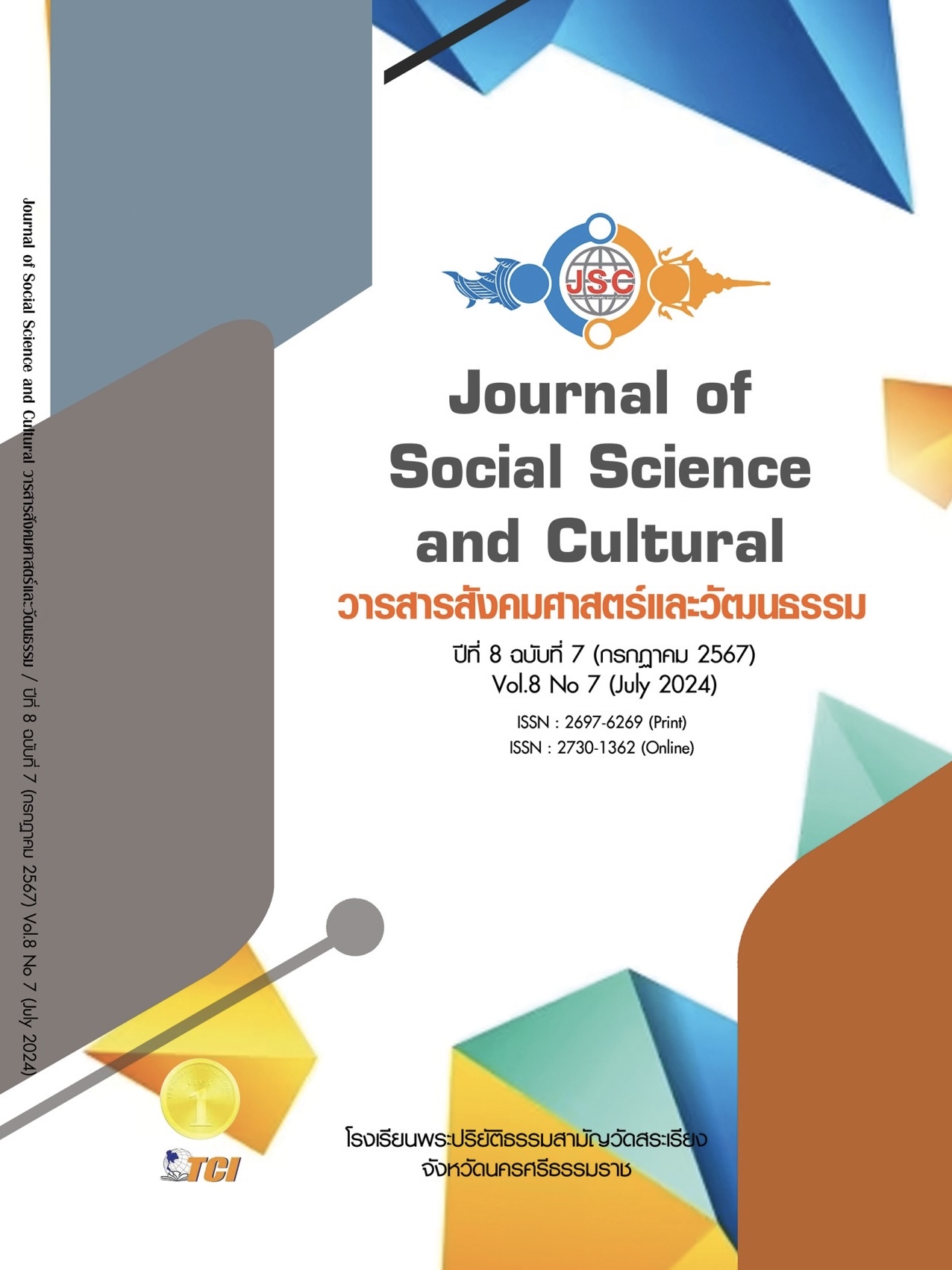FACTORS AFFECTING FOOD LITERACY AMONG MALE POLICE OFFICERS BORDER PATROL POLICE HEADQUARTERS
Main Article Content
Abstract
The aims of this research are as follows: 1) to evaluate the level of food literacy, and 2) to compare factors affecting the level of food literacy of 392 male police officers aged 45 years and over from the Border Patrol Police Headquarters. The tools used include: 1) Personal information form, and 2) Food knowledge assessment form (practice behavior). The quality of the tools was assessed by five experts. Data were analyzed using percentages, means, and standard deviations. The statistics used in the analysis to answer the research questions included Independent Sample t-test, One-way ANOVA, and Multiple Comparison. Statistical significance was set at the level of 0.05. The results of the research found that male police officers of the Border Patrol Police Headquarters have a level of food literacy in the interaction level for the four dimensions of food literacy: selection, planning and management, preparation, and eating. When considering the factors affecting the level of food literacy, it was found that the importance given to main meals, the methods of buying ingredients for cooking, and the cooking methods affect the level of food literacy, with statistical significance at (p<0.05). Factors such as police rank level, age, education, status, presence of congenital disease, and the number of meals per day did not affect the level of food literacy. This indicates for organizing programs or guidelines for developing the level of food literacy in the further.
Article Details
References
กรมควบคุมโรค. (2562). รายงานสถานการณ์โรค NCDs - เบาหวาน ความดันโลหิตสูง และปัจจัยเสี่ยงที่เกี่ยวข้อง. เรียกใช้เมื่อ 19 เมษายน 2567 จาก https://ddc.moph.go.th/uploads/publish/1035820201005073556.pdf
กวินดา วิเศษแก้ว และเบญจา มุกตพันธ์. (2563). ความสัมพันธ์ระหว่างความรอบรู้ด้านโภชนาการกับการบริโภคขนมและเครื่องดื่มรสหวานของนักศึกษาปริญญาตรีกลุ่มวิทยาศาสตร์สุขภาพ มหาวิทยาลัยขอนแก่น. ศรีนครินทรเวชสาร, 35(2), 183-192.
เกศินี จงมนตรี. (2563). โปรแกรมสร้างเสริมความรอบรู้ด้านอาหารในครูและบุคลากรทางการศึกษาวัยเกษียณ. ใน ดุษฎีนิพนธ์การศึกษาดุษฎีบัณฑิต สาขาสุขศึกษาและพลศึกษา. มหาวิทยาลัยศรีนครินทรวิโรฒ.
ชัชฎาภรณ์ จิตตา และคณะ. (2563). ความรอบรู้ด้านโภชาการของผู้สูงอายุ เขตสุขภาพที่ 5. วารสารโภชนาการ, 55(1), 62-77.
ธีรวุฒิ เอกะกุล. (2543). ระเบียบวิธีวิจัยทางพฤติกรรมศาสตร์และสังคมศาสตร์. อุบลราชธานี: สถาบันราชภัฏอุบลราชธานี.
นุชจรี ไม้จันทร์ดี. (2566). ความรอบรู้ด้านการบริโภคอาหารของผู้สูงอายุ โรงพยาบาลส่งเสริมสุขภาพศูนย์อนามัยที่ 2 พิษณุโลก. วารสารสุขภาพและสิ่งแวดล้อมศึกษา, 8(4), 459-466.
ภัทราพร ชูศรี และภัทระ แสนไชยสุริยา. (2563). ความชุกและปัจจัยที่มีความสัมพันธ์กับภาวะอ้วนลงพุงในวัยทำงาน (15-59 ปี) อำเภอกุดจับ จังหวัดอุดรธานี. วารสารวิจัยสาธารณสุขศาสตร์ มหาวิทยาลัยขอนแก่น, 13(2), 26-35.
รัตนาภรณ์ สาสีทา และคณะ. (2565). ความรอบรู้ด้านโภชนาการกับพฤติกรรมการบริโภคอาหารของนักศึกษาระดับปริญญาตรี คณะสาธารณสุขศาสตร์ มหาวิทยาลัยธรรมศาสตร์. วารสารสาธารณสุขมหาวิทยาลัยบูรพา, 17(1), 28-43.
โรงพยาบาลตำรวจ. (2566). รายงานผลตรวจสุขภาพประจำปี ข้าราชการตำรวจทั่วประเทศ. เรียกใช้เมื่อ 25 เมษายน 2567 จาก https://police.appprompt.com/
ลำใย นะราช และคณะ. (2567). ความรอบรู้ด้านโภชนาการและพฤติกรรมการบริโภคอาหารของผู้สูงอายุในเขตพื้นที่รับผิดชอบศูนย์สุขภาพชุมชนเมือง โรงพยาบาลอุดรธานี 2 อำเภอเมือง จังหวัดอุดรธานี. วารสารวิชาการสาธารณสุขชุมชน, 10(2), 125-137.
ศิริรัตน์ ปานอุทัย และคณะ. (2566). ความรอบรู้ด้านอาหารและพฤติกรรมการบริโภคอาหารของบุคลากรมหาวิทยาลัยเชียงใหม่. พยาบาลสาร มหาวิทยาลัยเชียงใหม่, 50(1), 55-67.
อังธนา จุลสุคนธ์ และนพวรรณ เปียซื่อ. (2562). ความรอบรู้ด้านโภชนาการและผลลัพธ์ทางสุขภาพของ ผู้สูงอายุที่เป็นเบาหวานชนิดที่ 2. วารสารสภาการพยาบาล, 34(4), 120-135.
Cullen, T. et al. (2015). Food literacy: Definition and framework for action. Can J Diet Pract Res, 76(3), 140-145.
Poelman, M. P. et al. (2018). Towards the measurement of food literacy with respect to healthy eating: the development and validation of the selfperceived food literacy scale among anadult sample in the Netherlands. Int J Behav Nutr Phy Act, 15(2018), 1-12.
Vidgen, H. & Gallegos, D. (2014). Defining food literacy and its components. Appetite, 76(2014), 50-59.


